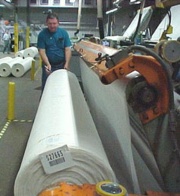Difference between revisions of "Cerex"
Jump to navigation
Jump to search
| (16 intermediate revisions by 2 users not shown) | |||
| Line 2: | Line 2: | ||
== Description == | == Description == | ||
| − | [CEREX Advanced Fabrics, Pensacola Florida] A registered trademark for a series of spunbond [[nylon fiber|nylon]] fabrics. Cerex® fabrics are made by heat-bonding continuous filaments of nylon. The smooth, flat, nonwoven fabrics are available in several weights. They have high tensile strength, excellent tear resistance and are unaffected by most [[solvent|solvents]], [[alkali|alkalis]], and dilute [[acid|acids]]. Cerex® fabrics have been commercially available since 1968. | + | [CEREX Advanced Fabrics, Pensacola Florida] A registered trademark for a series of spunbond [[nylon fiber|nylon]] fabrics. Cerex® fabrics are made by heat-bonding continuous filaments of nylon 6,6. The thin, smooth, flat, nonwoven fabrics are available in several weights. They have high tensile strength, excellent tear resistance and are unaffected by most [[solvent|solvents]], [[alkali|alkalis]], and dilute [[acid|acids]]. Cerex® fabrics have been commercially available since 1968. <ref>Arenstein,et.al. 2019</ref> |
== Applications == | == Applications == | ||
| + | * Cushioning | ||
| − | == | + | == Personal Risks == |
| + | Cerex® [[https://www.cerex.com/wp-content/uploads/2019/09/cerex_sds-clv3.pdf SDS Sheet]] | ||
| + | |||
| + | == Collection Risks == | ||
May accumulate a static charge. | May accumulate a static charge. | ||
== Physical and Chemical Properties == | == Physical and Chemical Properties == | ||
| − | |||
| − | |||
| − | |||
| − | |||
| − | |||
| − | == | + | * Cerex® has high tensile strength, high thermal stability and resistance to most chemicals and solvents. |
| + | * Melting Point = about 260 C | ||
| + | |||
| + | == Forms/Sizes == | ||
| + | Rolls widths are available up to 120 inches. Fabric weights range from 10 to 68 grams per square yard. | ||
| − | + | ==Resources and Citations== | |
| − | + | * CEREX Advanced Fabrics [https://www.cerex.com/ Website] | |
| − | * | + | * Rachael Perkins Arenstein, Lisa Goldberg, and Eugenie Milroy, ‘Support and Rehousing for Collection Storage’ In ‘Preventive Conservation: Collection Storage’ Lisa Elkin and Christopher A. Norris (eds.), Society for the Preservation of Natural History Collections, New York. 2019. |
| − | * | + | * Personal communication, Marie Svobada, MFA |
| − | * | + | * US Trademark Office - http://www.uspto.gov/ Date of first use = 1968. |
| − | * | + | * Preserv'Art at http://preservart.ccq.mcc.gouv.qc.ca/ProduitFiche.aspx?NoProduit=P0025 |
[[Category:Materials database]] | [[Category:Materials database]] | ||
Latest revision as of 10:32, 24 May 2022
Description
[CEREX Advanced Fabrics, Pensacola Florida] A registered trademark for a series of spunbond nylon fabrics. Cerex® fabrics are made by heat-bonding continuous filaments of nylon 6,6. The thin, smooth, flat, nonwoven fabrics are available in several weights. They have high tensile strength, excellent tear resistance and are unaffected by most solvents, alkalis, and dilute acids. Cerex® fabrics have been commercially available since 1968. [1]
Applications
- Cushioning
Personal Risks
Cerex® [SDS Sheet]
Collection Risks
May accumulate a static charge.
Physical and Chemical Properties
- Cerex® has high tensile strength, high thermal stability and resistance to most chemicals and solvents.
- Melting Point = about 260 C
Forms/Sizes
Rolls widths are available up to 120 inches. Fabric weights range from 10 to 68 grams per square yard.
Resources and Citations
- CEREX Advanced Fabrics Website
- Rachael Perkins Arenstein, Lisa Goldberg, and Eugenie Milroy, ‘Support and Rehousing for Collection Storage’ In ‘Preventive Conservation: Collection Storage’ Lisa Elkin and Christopher A. Norris (eds.), Society for the Preservation of Natural History Collections, New York. 2019.
- Personal communication, Marie Svobada, MFA
- US Trademark Office - http://www.uspto.gov/ Date of first use = 1968.
- ↑ Arenstein,et.al. 2019
